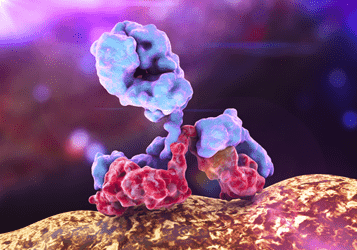- Home
- Products
- Customized ADCs
- GPC3
- Anti-GPC3 (Codrituzumab)-MC-Vc-PAB-SN38 ADC
Anti-GPC3 (Codrituzumab)-MC-Vc-PAB-SN38 ADC (CAT#: ADC-W-2322)
This ADC product is comprised of an anti-GPC3 monoclonal antibody conjugated via a MC-Vc-PAB linker to SN38. The SN-38 is targeted to certain cancers by immunerecognition and delivered into cancer cells via receptor mediated endocytosis. Within the cell, SN-38 binds to DNA, causes DNA damage.
- ADC Target
- ADC Antibody
- ADC Linker
- ADC payload drug
- Name
- GPC3
- Alternative Names
- GPC3; glypican 3; SDYS; glypican-3; DGSX; glypican proteoglycan 3; OCI 5; SGB; SGBS; SGBS1; secreted glypican-3; intestinal protein OCI-5; heparan sulphate proteoglycan; MXR7; OCI-5; GTR2-2;
- Target Entrez Gene ID
- 2719
- Target UniProt ID
- P51654
- Overview
- Cell surface heparan sulfate proteoglycans are composed of a membrane-associated protein core substituted with a variable number of heparan sulfate chains. Members of the glypican-related integral membrane proteoglycan family (GRIPS) contain a core protein anchored to the cytoplasmic membrane via a glycosyl phosphatidylinositol linkage. These proteins may play a role in the control of cell division and growth regulation. The protein encoded by this gene can bind to and inhibit the dipeptidyl peptidase activity of CD26, and it can induce apoptosis in certain cell types. Deletion mutations in this gene are associated with Simpson-Golabi-Behmel syndrome, also known as Simpson dysmorphia syndrome. Alternative splicing results in multiple transcript variants.
- Overview
- Humanized Anti-GPC3 IgG1-kappa antibody, Codrituzumab
- Generic name
- Codrituzumab
- Name
- MC-Vc-PAB (maleimidocaproyl-valine-citrulline-p-aminobenzoyloxycarbonyl)
- Description
- Peptide linkers, belonging to Enzymatically cleavable linkers, combine greater systemic stability with rapid enzymatic release of the drug in the target cell. The scission of peptidic bonds relies on lysosomal proteolytic enzymes, which have very low activities in blood due to endogenous inhibitors and the unfavorably high pH value of blood.
- Name
- SN-38 (7-ethyl-10-hydroxycamptothecin)
- Description
- SN38 (7-ethyl-10-hydroxy camptothecin) is an active metabolite of the cancer prodrug, irinotecan, with the ability of inhibiting Topoisomerase I, which is belong to the camptothecin family. SN-38 is formed via hydrolysis of irinotecan by carboxylesterases and metabolized via glucuronidation by UGT1A1.
For Research Use Only. NOT FOR CLINICAL USE.
Related Products
- Anti-ITGB2 (Rovelizumab)-MC-Vc-PAB-SN38 ADC (CAT#: ADC-W-1506)
- Anti-TNC (Tenatumomab)-MC-Vc-PAB-DMEA-(PEG2)-duocarmycin SA ADC (CAT#: ADC-W-1819)
- Anti-TNFRSF17-VC-MMAE ADC-8 (CAT#: ADC-W-269)
- Anti-TNFRSF10B (Conatumumab)-SMCC-DM1 ADC (CAT#: ADC-W-1862)
- Anti-CD28 (lumretuzumab)-SMCC-DM1 ADC (CAT#: ADC-W-2276)
- Anti-RhD (Atorolimumab)-MC-Vc-PAB-DMEA-(PEG2)-duocarmycin SA ADC (CAT#: ADC-W-1723)
- Anti-PDGFR (Tovetumab)-SMCC-DM1 ADC (CAT#: ADC-W-1712)
- Anti-CD70-β-glucuronide-Camptothecin Analog ADC-5 (CAT#: ADC-W-372)
- Anti-HIV-1 (Suvizumab)-MC-Vc-PAB-SN38 ADC (CAT#: ADC-W-2112)
- Anti-EGFR (Panitumumab)-MC-Vc-PAB-SN38 ADC (CAT#: ADC-W-1044)
Published Data
+ Submit Publications

Scientific Resources
Customer Reviews and FAQs
There are currently no Customer reviews or questions for ADC-W-2322. Click the button above to contact us or submit your feedback about this product.
Quick Links
Other Products
Same Target
Same Linker
Same Payload
| CAT# | Product Name | Linker | Payload |
| ADC-W-2323 | Anti-GPC3 (Codrituzumab)-MC-Vc-PAB-DMEA-(PEG2)-duocarmycin SA ADC | MC-Vc-PAB-DMEA-(PEG2) | duocarmycin SA |
| ADC-W-2319 | Anti-GPC3 (Codrituzumab)-SPDB-DM4 ADC | SPDB (N-succinimidyl-4-(2-pyridyldithio)butyrate) | DM4 (N2'-Deacetyl-N2'-(4-mercapto-4-methyl-1-oxopentyl)maytansine) |
| ADC-W-2318 | Anti-GPC3 (Codrituzumab)-SMCC-DM1 ADC | SMCC (N-succinimidyl 4-(Nmaleimidomethyl)cyclohexane-1-carboxylate) | DM1 (N2'-Deacetyl-N2'-(3-mercapto-1-oxopropyl)maytansine) |
| ADC-W-2321 | Anti-GPC3 (Codrituzumab)-MC-Vc-PAB-MMAE ADC | MC-Vc-PAB (maleimidocaproyl-valine-citrulline-p-aminobenzoyloxycarbonyl) | MMAE |
| ADC-W-2320 | Anti-GPC3 (Codrituzumab)-MC-MMAF ADC | MC (maleimidocaproyl) | MMAF |
| CAT# | Product Name | Linker | Payload |
| ADC-W-2614 | Anti-MS4A1 (Rituximab)-MC-Vc-PAB-SN38 ADC | MC-Vc-PAB (maleimidocaproyl-valine-citrulline-p-aminobenzoyloxycarbonyl) | SN-38 (7-ethyl-10-hydroxycamptothecin) |
| ADC-W-2607 | Anti-ITGB3 (Tadocizumab)-MC-Vc-PAB-MMAE ADC | MC-Vc-PAB (maleimidocaproyl-valine-citrulline-p-aminobenzoyloxycarbonyl) | MMAE |
| ADC-W-2608 | Anti-ITGB3 (Tadocizumab)-MC-Vc-PAB-SN38 ADC | MC-Vc-PAB (maleimidocaproyl-valine-citrulline-p-aminobenzoyloxycarbonyl) | SN-38 (7-ethyl-10-hydroxycamptothecin) |
| ADC-W-2602 | Anti-GPNMB (Glembatumumab)-MC-Vc-PAB-SN38 ADC | MC-Vc-PAB (maleimidocaproyl-valine-citrulline-p-aminobenzoyloxycarbonyl) | SN-38 (7-ethyl-10-hydroxycamptothecin) |
| ADC-W-2581 | Anti-CEACAM5-MC-Vc-PAB-SN38 ADC | MC-Vc-PAB (maleimidocaproyl-valine-citrulline-p-aminobenzoyloxycarbonyl) | SN-38 (7-ethyl-10-hydroxycamptothecin) |
| CAT# | Product Name | Linker | Payload |
| ADC-W-2608 | Anti-ITGB3 (Tadocizumab)-MC-Vc-PAB-SN38 ADC | MC-Vc-PAB (maleimidocaproyl-valine-citrulline-p-aminobenzoyloxycarbonyl) | SN-38 (7-ethyl-10-hydroxycamptothecin) |
| ADC-W-2593 | Anti-EGFR (Cetuximab)-MC-Vc-PAB-SN38 ADC | MC-Vc-PAB (maleimidocaproyl-valine-citrulline-p-aminobenzoyloxycarbonyl) | SN-38 (7-ethyl-10-hydroxycamptothecin) |
| ADC-W-2596 | Anti-ERBB2 (Trastuzumab)-MC-Vc-PAB-SN38 ADC | MC-Vc-PAB (maleimidocaproyl-valine-citrulline-p-aminobenzoyloxycarbonyl) | SN-38 (7-ethyl-10-hydroxycamptothecin) |
| ADC-W-2618 | Anti-MS4A1-MC-Vc-PAB-SN38 ADC | MC-Vc-PAB (maleimidocaproyl-valine-citrulline-p-aminobenzoyloxycarbonyl) | SN-38 (7-ethyl-10-hydroxycamptothecin) |
| ADC-W-2552 | Anti-CD74-MC-Vc-PAB-SN38 ADC | MC-Vc-PAB (maleimidocaproyl-valine-citrulline-p-aminobenzoyloxycarbonyl) | SN-38 (7-ethyl-10-hydroxycamptothecin) |
Online Inquiry
Welcome! For price inquiries, please feel free to contact us through the form on the left side. We will get back to you as soon as possible.



